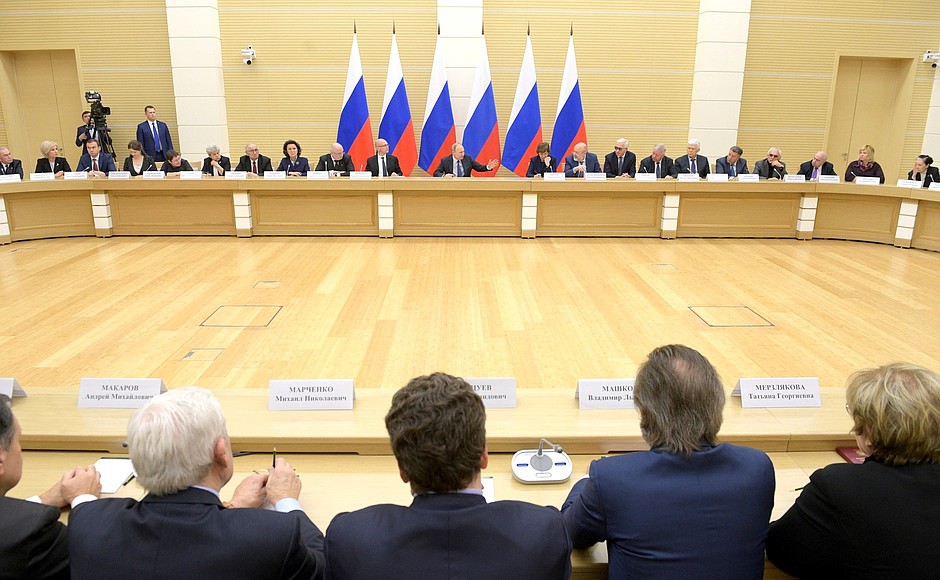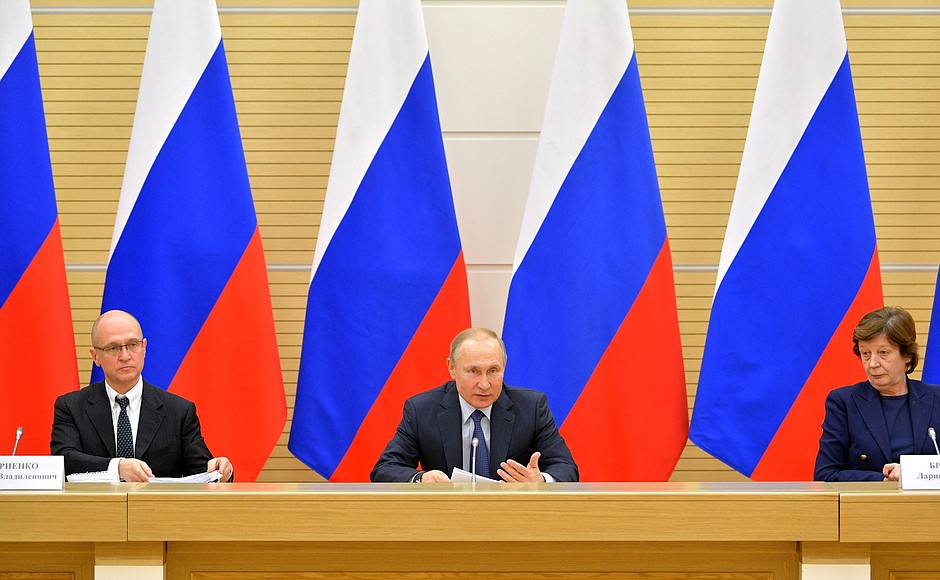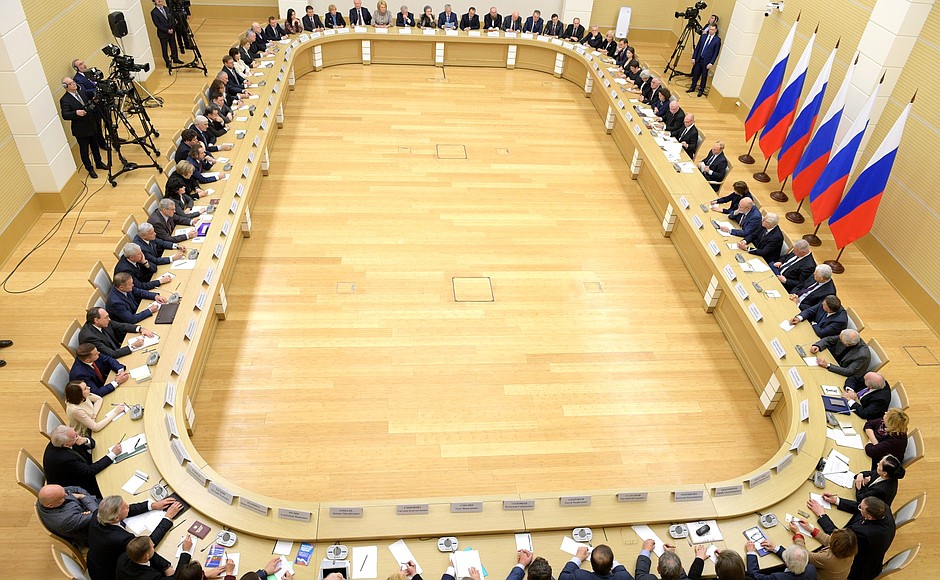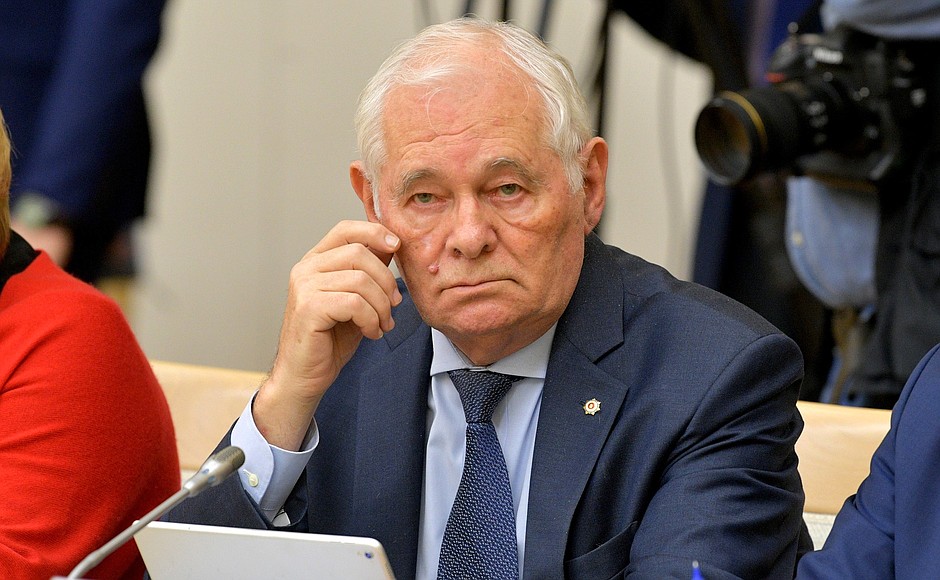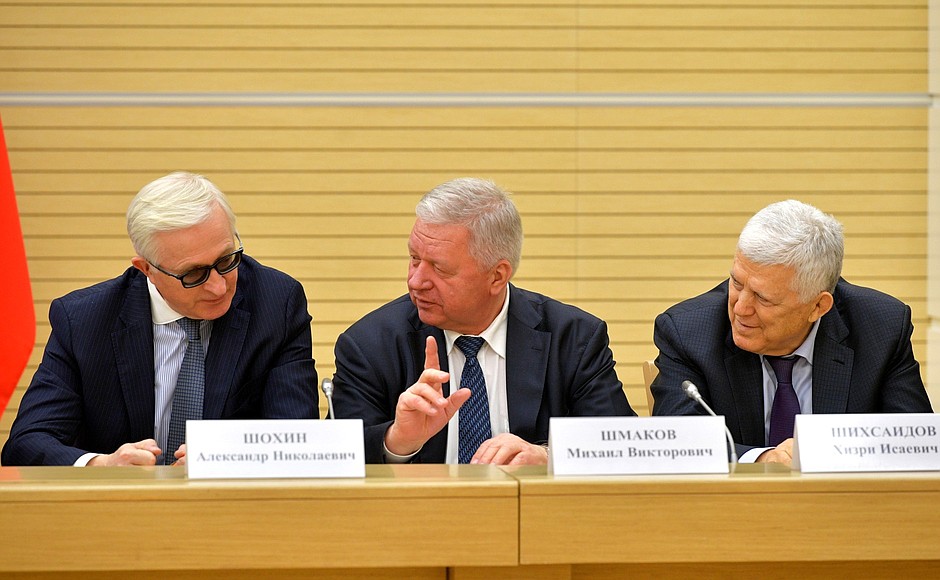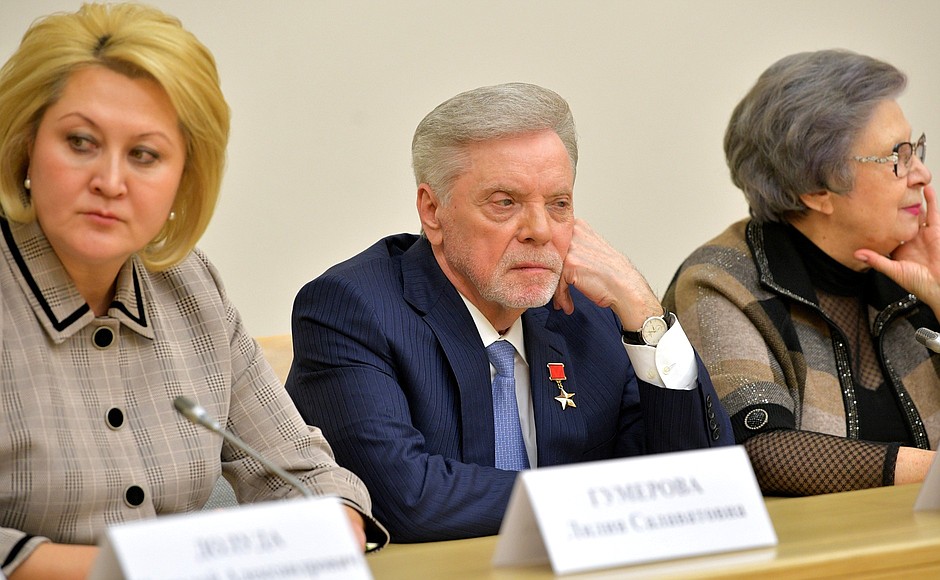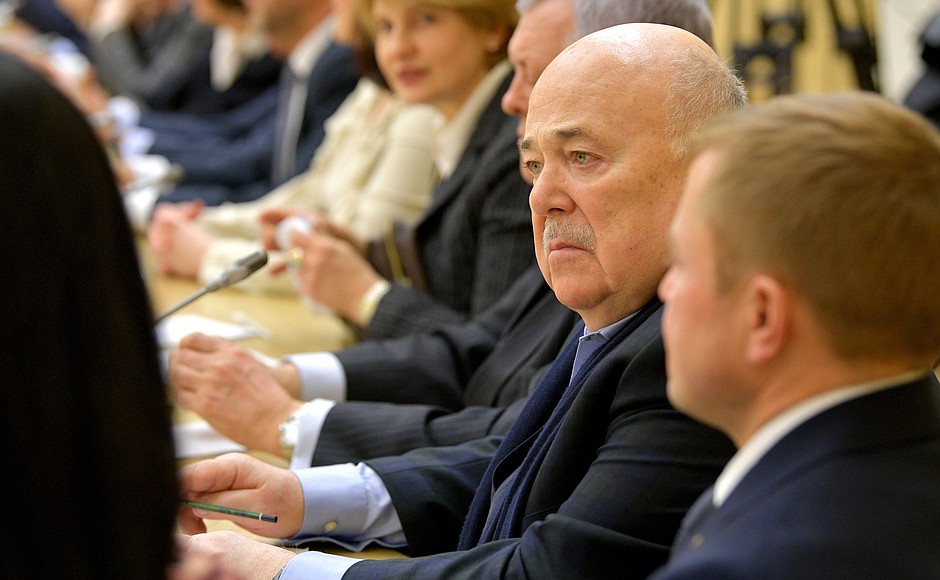The meeting brought together representatives of legislative and executive authorities, academic community, the arts, as well as prominent public figures.
* * *
Excerpts from transcript of working group meeting on drafting proposals for amendments to Constitution
President of Russia Vladimir Putin: Good afternoon, colleagues,
We met almost a month ago, and I know that the working group almost immediately got down to this, frankly speaking, difficult work.
As far as I understand, when you started, you faced a great response from the public – the number of submitted proposals for amendments has already exceeded 500, if I am not mistaken. This is surely a great challenge not only for the working group but for all of us, as we are working together on the Basic Law. That is what it is called – the Basic Law – in the Constitution because it forms the basis of our entire legal system and regulates all the basic and fundamental principles of our life.
It is extremely important here to double-check every word, every letter, and every comma. But at the same time, we should not omit what was created with great effort of our people and enshrined in the current Constitution; we should not lose anything but, on the contrary, we must meet today’s challenges. I am sure that today we will discuss some issues of precisely this nature, of this scale.
Here is what I mean. In 1993, it was impossible to enshrine certain things in the law, not only in the Basic Law, in the Constitution, but in any law whatsoever, because this simply did not exist. There was no internet then, and so on. This is the first point. Second, the country was not in the same condition as it is now.
It was difficult for us to formulate some things, especially those related to the country’s sovereignty or to the place of our country in the world. At that point we could not guarantee social guarantees, sorry for the tautology, because the economy was in such a state that any laws passed by parliament could not have any financial backing, so it was more or less pointless and moreover, it was even harmful.
Then we realised that it was simply harmful, because law was adopted clearly without any hope that it would be implemented. Because, when adopting the law, we already knew that there were no funds for its implementation. And then, of course, we could only state social guarantees in a general way. But now the situation is different. I mean the indexation of pensions, for example, or the minimum wage, and so on. It was then impossible to write it in the Basic Law. Now our economy is in a different state, so that we can, and if we can, then we must do it.
I understand that there are a lot of questions, and I am not going to distract you with some general phrases. Today we have a purely working meeting. I know that you travel a lot in the regions and work with the public in Moscow, and you are constantly in touch with professional communities. Therefore, we are having the second, but also absolutely working meeting. I am at your service. If there are any questions that you would like to raise at this second meeting, let us discuss them.
Thank you very much for your attention.
* * *
On work on the proposed amendments to the Constitution
Vladimir Putin: As I have already said, more amendments are coming in. There are over 500 amendments. And, probably – not probably, definitely – we will not be able to include all of them in the Constitution. Is there a need for this? We must think this through, of course. But we must certainly not lose anything that is turned out by the working group.
What do I mean and how will we do this?
If there is no room for something in the Fundamental Law or it is pointless to include something in the Fundamental Law we should keep it and create several packages. One should be sent to the State Duma and the Federation Council; the second package should go to the regions, municipalities and the Government, of course, for it to use proposals made by the public and some NGOs within its various competencies so as to consider them in their work and in the adoption of the delegated legislation. All this should be analysed, in any case. It should never be shelved.
On a national vote
Vladimir Putin: I will agree with everything the specialists suggest. Any legal system is a complicated organism with many parts and many areas: state legislation; constitutional law is a special branch in law and responsibility is very high. There should be no mistakes here. I will agree to what the specialists recommend. It is only important that everything we do strictly complies with current law and the current Fundamental Law.
I consider only one thing to be important, and I want to tell you about it and draw your attention to it. The adoption of a law on amendments is a relatively simple procedure – this law should be reviewed by the Duma, the Federation Council and the legislative assemblies of two thirds of the regions of the Russian Federation, which is fairly difficult but still a working procedure. However, considering the importance of the issues that we are submitting to a national vote and the significance of the changes we are introducing to the Fundamental Law, I believe that the people should take a direct part in adopting these decisions.
It does not matter to me what certain articles will say. But it is important to me that the law on amendments enter into force only after the results of a national vote are summed up, that this is a true plebiscite and that Russian citizens are the authors of these amendments to the Fundamental Law. This is what matters. The way you phrase them and where you put them and what executive order must be signed are all technical matters.
Importantly, citizens of the Russian Federation should record their authorship of the law. It will be as the people say. If the people reaffirm during the vote that they support the law, it will enter in force and amendments will be made to the Constitution. If they do not confirm their support for the law, there will be no amendments to the Constitution.
As for the voting day and those who should organise it, I fully agree: of course, nobody will do this except for the Central Election Commission. So I will sign this directive and we will issue it today or tomorrow.
We agreed that this should be done on a weekday. That is correct. It will be a weekday that will be proclaimed a day off. But this day off should not be taken from the New Year or May holidays. I would like to draw the Government’s attention to this.
On enshrining in the Constitution Russia’s status as the winning power in World War II
Vladimir Putin: I have been speaking publicly about this a lot. Attempts to rewrite history are harmful and, of course, have certain implications. These attempts are designed for today and tomorrow, this is obvious.
Incidentally, such a broad social movement as the Immortal Regiment confirms your words to a great extent about how deep this is in the heart of our people, our gratitude to the winners and an understanding of the significance of what they did for us, for future generations. We should repeat this more often.
The archival documents, including the German ones, explicitly phrase the goals that the Nazis set themselves in relation to Russia: to keep a small part of the working population for labour, for slave labour, and all the rest would be sent to the Urals, to the north. A death sentence, in other words. It was about the elimination of the ethnic group as such.
We could have been eliminated. And we must never forget this. That is why we will always be grateful to those who gained this victory for us. Should this be noted in the Constitution? And if so, where? We need to think about it. The idea itself, of course, is a good one.
On amendments regarding the role and status of the family
Vladimir Putin: Let me debate with you a bit, enter into polemics, if you wish.
As you said, a family is the union of a man and a woman. And if it is a single-parent family, then what? Some things need to be clarified. Marriage is the union of a man and a woman. A family is something slightly different. But the idea itself is correct and must be supported. We just need to think about the wording and where to do it.
As for “parent number one,” and “parent number two,” I once spoke publicly and will repeat it: as long as I am President, we will have no “parent number one,” there will be a father and a mother.
On Russia’s nuclear status
Vladimir Putin: As for the nuclear status, I am not sure this should be written into the Constitution because there is no question that we are a nuclear power today. What matters is for us to always be a step ahead with the latest arms systems. But these systems may not necessarily have to be nuclear. They could be weapons based on new physical principles, or maybe something different that would not be appropriate to discuss now but something our scientists and our industry are working on.
So the nuclear status is not forever. As one energy specialist used to say, the Stone Age ended not because people ran out of stones but because new technologies came along. The same applies to defence; probably, at some point nuclear arms will not be the most effective weapon or will become obsolete. Some experts abroad are working to make nuclear weapons pointless for their owners.
For example, the missile defence system that you know was designed with this goal in mind, notably, to deactivate our nuclear potential, to make it useless. But after we developed hypersonic weapons, their attempts to do this became pointless. Their expenses, which ran into billions, became a waste. This is true: this country should be a step ahead in defence, but I am simply not sure whether this should be written into the Constitution. Let me repeat: the nuclear status is very important today and will be important for a long time, but it will not be forever.
* * *
Vladimir Putin: I suggest finishing our meeting at this point. I would like to thank you. As is clear from our discussion, there are issues that require additional review. This is obvious. There are also issues that should be laid out more precisely rather than discussed.
But one thing is clear and, honestly, I am grateful to you for what was said. Life has changed and it requires a certain response, in the Constitution as well. This is an obvious fact in terms of technology, the general state of our society, the financial potential of our state and our status. What we are doing now is correct and it should be designed for the long term.
It is also obvious that the Constitution is the Fundamental Law, but this is not a simple law. It is largely of a political and even a moral and ethical character. Therefore, despite any criticism from the outside, it is important to make sure all social strata and professional communities are represented. If Denis Matsuyev is a brilliant performer and some people write about this, they do it only because they are envious of his talent. But he knows what his colleagues think of. Just like our wonderful children’s doctor knows what physicians think, how they live and what they expect from the state. Representatives of public and youth organisations are also aware of their issues. So, the presence of each of you is important.
Yes, probably not everything will be included in the Fundamental Law but it is extremely important to think about the problems you raise and, whenever possible, to reflect them in the Fundamental Law, because in the final analysis this is what will unite the country.
Thank you very much.
